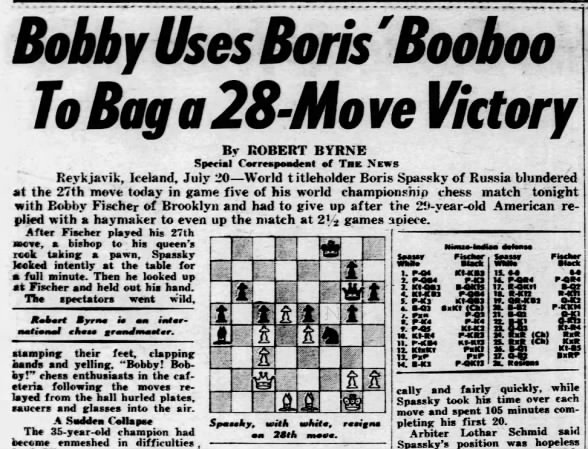Daily News New York, New York Friday, July 21, 1972 - Page 4
Bobby Bags 28-Move Victory by Robert Byrne
Reykjavik, Iceland, July 20—World titleholder Boris Spassky of Russia blundered at the 27th move today in game five of his world championship chess match tonight with Bobby Fischer of Brooklyn and had to give up after the 29-year-old American replied with a haymaker to even up the match at 2½ games apiece.
After Fischer played his 27th move, a bishop to his queen's rook taking a pawn, Spassky looked intently at the table for a full minute. Then he looked up at Fischer and held out his hand.
The spectators went wild, stamping their feet, clapping hands and yelling, “Bobby! Bobby!” chess enthusiasts in the cafeteria following the moves relayed from the hall hurled plates, saucers and glasses into the air.
A Sudden Collapse
The 35-year-old champion had become enmeshed in difficulties in holding off possible attacks on his weak pawn position, but his sudden collapse on the 27th move, after about 3½ hours of play, was not expected. It took Spassky only a moment to decide that continuing the game would be hopeless.
Fischer's smashing bishop sacrifice could not be accepted for 28. Here's how the moves would have gone: 28. QxB QxP; 29. K-B2 N-Q6ch; 30. K-N3 Q-R6ch; 31. K-B3 Q-B5ch; 32. K-K2 N-B8 would have been checkmate. Refusing the offer by 28. Q-N1 BxB; 29. QxB QxP would have left the battered Spassky two pawns down and given him no chance to halt the further decimation of his remaining pawns.
Earlier Fischer had reverted to the Nimzo-Indian defense which he had employed against Spassky in the first game of the $250,000 match. But this time he followed up by doubling the Russian's queen's bishop pawn and set up a blockage which fixed the weaknesses of the enemy pawn formation.
Spassky's attempt to gain attacking room at his 11th move faltered against Bobby's ingenious reply which virtually forced the exchange of knights, giving Fischer a free position.
Although Spassky got a protected passed pawn by his exchange at the 13th move, he remained encumbered by the necessity of keeping a watchful eye on the three shaky pawns at Qr4 Qb4 and K4. He had to try either Q-K3 Q-B2 or Q-N1 at the 27th move, but whether his game would have been tenable in the long run is doubtful.
The American played methodically and fairly quickly, which Spassky took his time over each move and spent 105 minutes completing his first 20.
Arbiter Lothar Schmid said Spassky's position was hopeless when Fischer made his 27th move.
“I knew it was coming,” Schmid said. “In fact, I was ready to get off my chair any moment.
The Experts Stunned
The fact that Fischer had now won two games playing black stunned the experts.
“We thought Fischer was a master of attacking chess,” said one international grandmaster. “Now he has turned out to be a genius of defense.”
Spassky's second, Svetozar Gligoric, said the actual turning point came on the 25th move, when Spassky chose the wrong plan and doubled his rooks on the king's bishop rank.
“A Terrible Mistake”
“It was a terrible mistake for a world champion,” Gligoric said. “It ranked with the blunder Fischer came up with in the first game.” ([while distracted by bulky cameras operated by disruptive crews of men])
Fischer had allowed his lone bishop to become trapped in the first game and resigned to Spassky on the 56th move.
“More Fischer Requests”
USSR selecting Anti-American, Racist Iceland who restricted entry of blacks and news coverage. See New York Times, 7/21/1972 by Harold C. Schonberg: “The manager of the hotel, however, said today that this was the first he had heard of the request”. Mr. Cramer said, in response to the pool issue that Fischer ‘only wanted to use it before game time.’ Mr. Cramer said that “most of these 14 points were already taken care of” and “making a fuss over nothing.”

 Bobby Bags 28-Move Victory 21 Jul 1972, Fri Daily News (New York, New York) Newspapers.com
Bobby Bags 28-Move Victory 21 Jul 1972, Fri Daily News (New York, New York) Newspapers.com
























